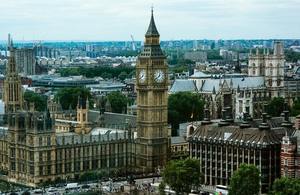Tried and tested system for calling elections restored
The Dissolution and Calling of Parliament Bill has today received Royal Assent from Her Majesty The Queen.

The democratic way elections have been called for generations has been restored, with tried-and-tested arrangements preventing stalemates in Parliament from paralysing democracy.
The Dissolution and Calling of Parliament Bill has today received Royal Assent from Her Majesty The Queen.
This important legislation delivers on the government’s manifesto pledge to repeal the Fixed-term Parliaments Act 2011, which brought about chaos and constitutional deadlock in 2019, restoring clear and flexible constitutional arrangements that served successive Governments and Parliaments well for generations.
The measures which have been approved by Parliament do the following:
- Restore the long-standing constitutional norm that the Sovereign may grant a dissolution of Parliament, on the request of the Prime Minister, leading to a general election
- Provide certainty and flexibility – two vital constitutional principles in a healthy democracy – which will prevent British democracy being paralysed
- Reinforce the constitutional principle that the government of the day governs by virtue of their ability to command the confidence of the House of Commons
- Enables the government to seek a fresh democratic mandate from the British public where necessary, and in doing so reaffirms the central role of the voters in our democracy
Minister for the Cabinet Office Michael Ellis said:
The Fixed-term Parliaments Act was not fit for purpose, causing constitutional chaos in 2019 and delaying the government acting on people’s priorities.
At critical moments, we must trust the British public’s good judgement. Elections give the public a voice, and it’s right that we return to a tried-and-tested system that allows them to take place when needed.
Minister of State at the Cabinet Office Lord True said:
In delivering this manifesto pledge, we are returning to a tried-and-tested system for calling elections, ensuring that political gridlock doesn’t strip the public of an effective government.
Under the Fixed-term Parliaments Act, which has governed how UK Parliamentary elections are called since 2011, an election could only be triggered outside of the normal five-year Parliamentary cycle by one of two scenarios: if two-thirds of the House of Commons voted in favour of one, or if the Government lost a vote of no confidence and no alternative government was confirmed by the House of Commons within 14 days.
This law caused chaos and constitutional deadlock in 2019, and neither the 2015 Parliament nor the 2017 Parliament lasted their full term.
In fulfilling this key manifesto commitment, the Government has ensured that ultimate power always rests with the British public, either through the confidence of the House of Commons or through an election.
Notes to editors:
The Dissolution and Calling of Parliament Act does the following:
- Repeals the Fixed-term Parliaments Act 2011;
- Revives the prerogative powers relating to the dissolution of Parliament, and the calling of a new Parliament. In doing so, the Act allows a Prime Minister to request a dissolution from the Sovereign which, if granted, would enable a Prime Minister to call a general election at a time of their choosing;
- Reaffirms the long-standing position that these prerogative powers are not reviewable by courts, providing increased legal clarity;
- Ensures that Parliament will automatically dissolve five years after it has first met, if it has not been dissolved sooner;
- Makes consequential amendments to pieces of legislation that make reference to the 2011 Act ensuring their continued operation.
The Act will extend and apply to England, Wales, Scotland and Northern Ireland.